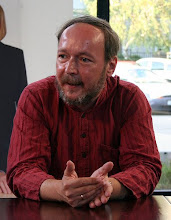
I attended a seminar on Gandhi's moral and political philosophy, organised by the Department of Philosophy of the Central University of Hyderabad. The three day event was a good opportunity for me to learn to see Gandhi as a complex thinker whose thoughts and life serve with powerful lessons for us today.
About half of the presenters spoke about Gandhi and his philosophy as part of history. I could see how difficult it is not to deify such a great person. However understandable can the temptation to deify Gandhi, it is undesirable as deification creates a distance between us and the deity. The other half of the presentations addressed contemporary issues in the light of Gandhi's philosophy.
For me Professor Sunil Sahasrabudhy's lecture on a Gandhian approach to knowledge politics was the most inspiring part of the seminar. It gave a brief summary of the paradigm shift taking place in the field of knowledge activities. Modernity privilegized science. Science was seen as the only desired way to knowledge. All other forms of knowledge have been seen, at best, as auxiliary. Knowledge activities primarily took place in universities. The concept of knowledge was construed through the scientific method. Knowledge spread throughout the entire society was not seen as equally valuable as it lacks the rigor of science.
With the dawn of the Information Age the absolute nature of science was questionned. Knowledge has been seen as anything that can be organised using information technology. Knowledge management has become the crucial knowledge activity.
This paradigm shift creates an opportunity for grassroots, common knowledge, using an Indian concept:
lokavidya, to gain unprecedented status. As far as
lokavidya can be organised into formats processable for computers, grassroot knowledge can serve as a source for knowledge activities. Knowledge activities increasingly take place in the virtual space rather than being restricted among the walls of the university. While this paradigm shift is potentially empowering for the lokavidya and for grassroot people, empowerment happens only if people themselves have the control over their knowledge. That is why a new knowledge politics is needed. Professor Sahasrabudhey called for a new movement of
satyagraha (Gandhi's non-violent resistance) in the field of knowledge.
Knowledge Satyagraha is to cleanse the world of knowledge. It stands for a reorganisation of the social logic of knowledge on the bases of equity and human concerns. It is the chief method to oppose hierarchies, privatization and restrictive use policies in connection with knowledge and knowledge activities. It intends to rediscover the principle of legitimization in the knowledge activity of the people.
Mental health users' lived experiences and experiential knowledge, user controlled alternatives to coercive psychiatry are all parts of
lokavidya, which has not gained due recognition yet. I suggest that user/survivor communities join in the
Knowledge Satyagraha.
Another exciting paper was Professor Amita Dhanda's lecture on Gandhi and law. The major morale of her presentation was her request to each generation to understand what "rule of law" means and when non-compliance with a legal regime is warranted. Again I found this idea directly applicable in the mental health field: in a world of disqualifying mental health related laws, a mere adherence to the existing laws without challenging them acts against the deeper meaning of a rule of law society.
I am thankful to Amita and Professor Raghuramaraju for allowing me to participate in this exciting scholarly meeting.
 Day 2 of the National User Workshop was attended by 23 users/survivors.
Day 2 of the National User Workshop was attended by 23 users/survivors.












